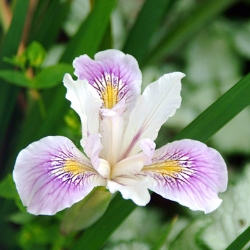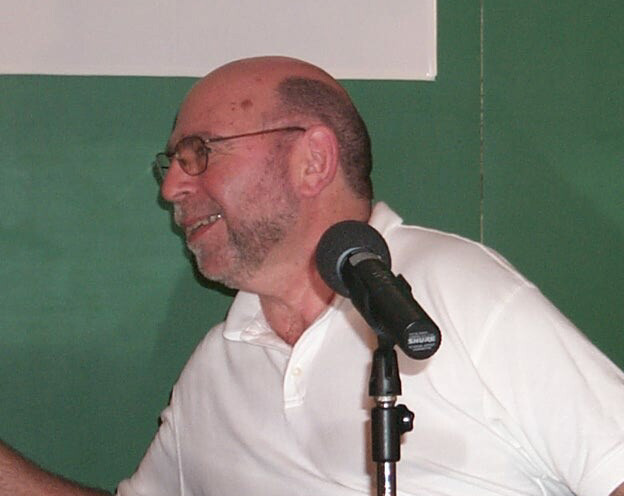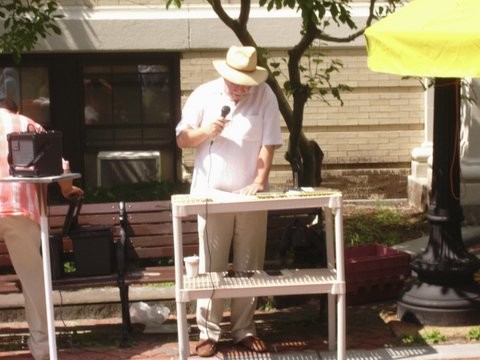
|
Charles Levenstein is Professor Emeritus of Work Environment Policy at University of Massachusetts Lowell. He has a Ph.D. in economics from M.I.T. and a masters degree in physiology and occupational health from Harvard School of Public Health. He is editor of NEW SOLUTIONS, journal of occupational and environmental health policy, and author of numerous articles in peer-reviewed journals as well as of several books, including
The Cotton Dust Papers (with G. DeLaurier and M.L. Dunn) and The Point of Production (with J. Wooding). His poetry has been published in many e-zines, including
Loch Raven Review, Niederngasse, Poetry Bay, Numbat,
MiPo, and others. He has published three collections of poems: Lost Baggage (Loom Press, 2001),
Poems of World War III (Lulu, 2007) and Animal Vegetable (Lulu, 2007). Christopher T. George is co-editor of Loch Raven Review. George was born in Liverpool, England in 1948 and now lives in Baltimore, Maryland, near Johns Hopkins University, with his wife Donna and two cats. Chris works full-time as a medical editor in Washington, DC. He has been writing and publishing poetry since he attended Loyola College, Baltimore, and studied with Sister Maura Eichner at the College of Notre Dame, as well as with poets Elliot Coleman and Marion Buchman. His poems have appeared in numerous publications in the United States and Great Britain. He is also a published historian and a lyricist for a new musical, Jack-The Musical, about Jack the Ripper. George also is the Editor of Desert Moon Review and an editor at Writer’s Block Poetry Workshop.
|
Spring 2007 Table of Contents - Vol. III, No. 1 |
|
|
Poetry Translations Interview Essays Fiction Book Notes & Reviews |
|
|
Christopher T. George
An Interview with Charles Levenstein
A candid shot of poet and scientist Charles Levenstein, Ph.D., M.S.O.H, while lecturing.
CL: I think that there are many ways to “know” things. Life does not fit into the neat categories that we require in scientific investigation. On the other hand, I do not require poetic perception to change a tire or a light bulb. There are many different stories about reality. I find them complementary, not competitive.
Here’s a poem I wrote a while back that can serve as my answer to your question about science versus art:
CL: The poems were written because I was asked to read at the Farmers Market in Lawrence, Massachusetts, last August. The Director of the Robert Frost Society had read my book, Poems of World War III, and he invited me to read during the market. He also requested, since it was a produce market, if I would read some “vegetable” poems. I agreed to do so—but when I searched through my files, I did not find a single poem about produce. I did find a lot of animal poems—but that’s not really what he wanted. So I wrote the vegetable poems you are including in this issue of Loch Raven Review to satisfy his request. This involved no attempt at all to speak about environmental issues. CTG: I like the blurb for your book, Animal Vegetable: “He [Levenstein] has tried to look at nature. . . as more than something to eat. The poems in this small volume are evidence of the effort to transcend urban anthropocentrism.” CL: It’s all true. My environmentalism has been concerned with work environments. I was raised in New York City at a time when a swamp was a swamp, not “wetlands.” It takes effort on my part to pay attention to the “natural” environment. My natural environment is the subway. CTG: The publicity for Animal Vegetable implies that you are retired—although in your emails to us I have noticed you include an address wherein you designate yourself as Scientific Review Administrator, Constella Group, LLC. Can you clarify your present status? CL: I have retired from teaching, but I have not retired from research. I do some consulting, and my “volunteer” activity has grown considerably. I am adjunct professor of occupational health at Tufts University School of Medicine, so I lecture there occasionally, as well as other institutions. I continue to edit New Solutions, a quarterly journal of occupational and environmental health policy, and a book series on “Work, Health and Environment.” And I am co-chair of the Massachusetts Teachers Association’s Environmental Health and Safety Committee and I’m on the board of the Massachusetts Public Health Association. The Constella “job” is short-term consulting: I am organizing peer review panels for a research institute. CTG: I had a look at the website for the Constella Group which has as its slogan “Enhancing human health around the world, every day.” Maybe your work is more directed at global health than the environment as such but I wondered what you thought of former Vice President Al Gore and his recent triumph in winning the Academy Award for the documentary “An Inconvenient Truth.” Is the former Veep on the mark, or does he exaggerate the danger of global warming? I realize that right wingers are trying to paint him as a nut and a fabricator of data. Your reaction to that sort of labeling of Mr. Gore? CL: I liked Gore’s movie very much. I think he has very important things to say and I am glad that the public seems interested in hearing his message. I don’t think he exaggerates the dangers of global warming, and I think that we do not like to hear about the pace of ecological changes accelerating. He is certainly not a nut. On the other hand, I am not a fan of the “center” Democrats. I have seen the impact of restructuring of government activities inspired by Gore’s “reinvention” project. “Contracting out” of government services, for instance, undermines the social purpose of government. CTG: By contrast, “Getting Married” would seem to be a very personal cycle, digging into some bugbears and conflicts about your own family and friends and their Jewish background. How autobiographical is it? It reads as if it is pretty factual and is highly interesting for that, and for its frankness. There could I suppose be more flights of fancy or poetic touches but the down-to-earth quality of the narrative as well as the touches of humor, often self-deprecatory, is appealing. CL: Completely imaginary, fantasy characters, never happened. CTG: If only that could have been your answer to how factual is the Al Gore movie! Chuck Levenstein reading his poetry at the Lawrence, Massachusetts, Farmers Market, August 2007.
© Christopher T. George |
|
|
Poetry Translations Interview Essays Fiction Book Notes & Reviews |

